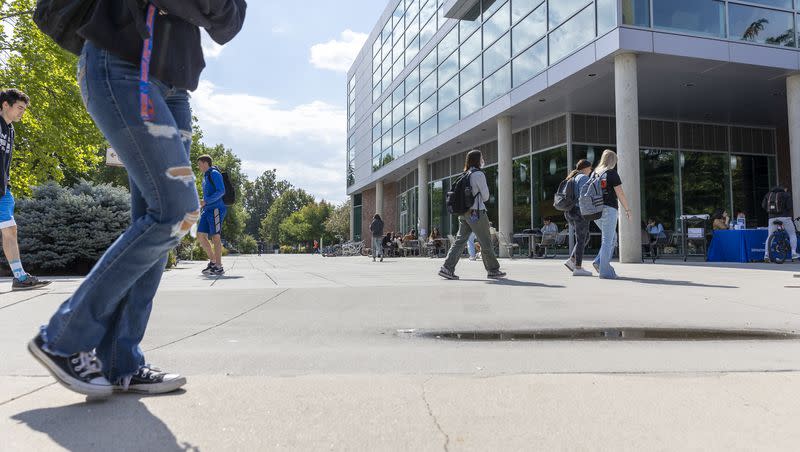Sen. Mike Lee, Rep. Burgess Owens push for curbing the cost of higher education

- Oops!Something went wrong.Please try again later.
As college graduates struggle under piles of unpaid loans, Democrats and Republicans are bringing very different ideas to the table on how to deal with the rising cost of higher education.
The average yearly tuition at a public university was $9,400 in 2021, and $35,000 at a private university, according to federal statistics — and by all measures it is still rising fast.
Earlier this week, the Biden administration revealed its plans to cancel $130 million in federal student debt for more than 7,000 attendees of a for-profit Colorado college that allegedly used deceptive marketing strategies to enroll students.
“These borrowers were lied to, ripped off, and saddled with mountains of debt,” said President Joe Biden in a statement, promising to forgive borrowers’ loans.
This is just the latest loan cancellation program undertaken by the Biden administration, after a much larger attempt to forgive loans for most borrowers was rejected by the Supreme Court, who said the administration didn’t have the power to forgive loans unilaterally.
Related
Republican lawmakers on Capitol Hill are also focused on the cost of higher education this week, but they have much different solutions in mind.
In the upper chamber, Sen. Mike Lee of Utah introduced the Higher Education Reform and Opportunity Act Thursday, which would cap the amount of money students can borrow, and require colleges to repay a percentage of loans issued to students who struggle to make payments. It would also give students more information about how education pays off — or doesn’t.
Sponsored in the House by Rep. Chip Roy, R-Texas, the law would also give states more flexibility on what students need to do to earn a degree.
Meanwhile, the House Subcommittee on Higher Education and Workforce, chaired by Rep. Burgess Owens, R-Utah, discussed ways to increase the value of a college degree for students, institutions and taxpayers at a hearing on Thursday.
Where Democrats are forgiving loans, Republicans want to disrupt a system that isn’t working, Owens told the Deseret News after the hearing.
“Our focus is to make sure our kids are prepared to get out in the workforce, build their dreams, build their homes, get married — all the stuff that is much tougher to do right now,” he said. “When you come out with a degree that means nothing and are in debt, that slows the whole process down.”
Colleges face no consequences for the failure of their graduates while the taxpayers are left to foot the bill, he said.
So, if education does not yield a return in the form of a job, then both taxpayers and students, who pay for college and take on the risk, lose, said Dr. Andrew Gillen, a senior policy analyst at Texas Public Policy Foundation, in his written testimony.
In his opening remarks at the hearing, Owens said college used to be cheap and led to good-paying jobs.
“That is not the case today,” he said. “Outdated measures of quality, coupled with virtually zero transparency of value, have distorted the postsecondary education marketplace.”
Tuition fees have quintupled at public and private four-year schools since 1970.
A 2020 survey of 13 to 39-year-olds found that although most individuals are optimistic about achieving the “American Dream,” more than 40% cited the number one barrier as the cost of higher education.
Owens, who represents Utah’s 4th congressional district, suggested the Higher Education Act needs thoughtful reforms, like mandating colleges to be more transparent about the fees and the burden of debt the student will incur.
He told the Deseret News that educational institutions should have more “skin in the game” and be held accountable for the success of their students — and said a lack of success could lead to consequences, like the college losing federal funding grants. Or if the students can’t repay their debt, then colleges step up to reimburse the taxpayer, as Lee’s latest legislation suggests.
Owens said higher education should innovate. He used the Texas State Technical College as an example of a school that has an original performance-based financing model where it earns money in relation to how well graduates are prepared for the real world.
In exact terms, the college “is paid a share of the increase in state taxes that their students generate for the state,” said Gillen, the policy analyst.
Owens said it was the first time he heard of such a model.
“Think about this particular college — their students have to succeed. They cannot push out curriculum that’s not going to fit the marketplace, they can’t push in ideology that doesn’t fit into the marketplace, they have to have these kids leaving with skills ... or they don’t get paid,” he said.
Owens said COVID-19 revealed big holes in the current system and now, “We’re having conversations in both the House and in the Senate, that we just would not have had, if not for the pause of saying that our children are not succeeding the way they should.”

